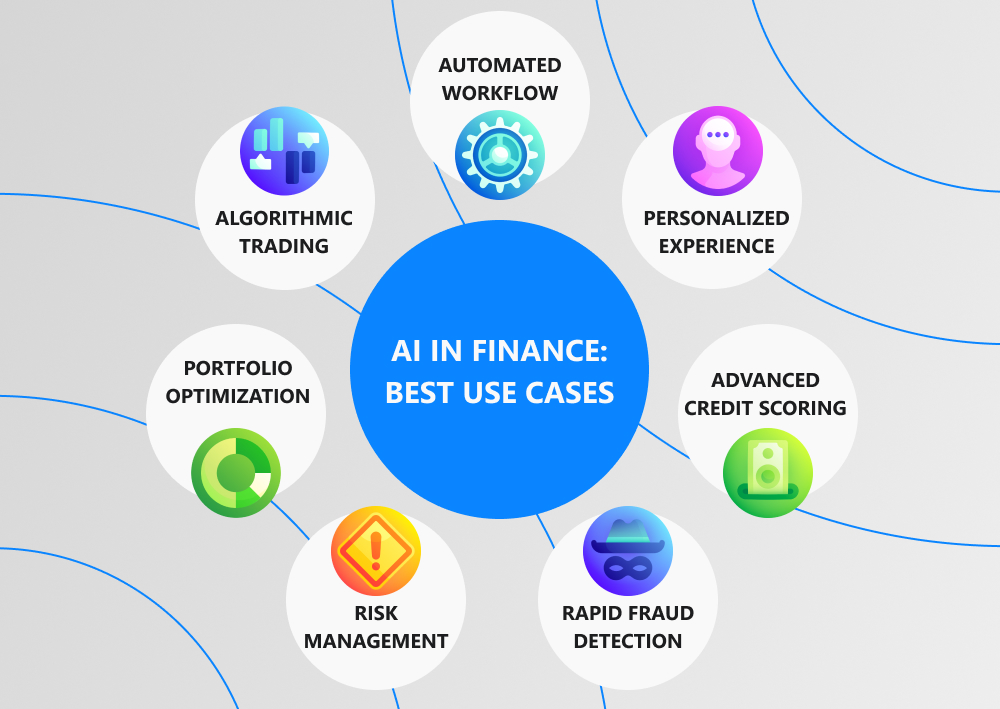Have you ever used a chatbot in a mobile banking app to get financial advice? Was it valuable? If so, it means your bank effectively employs AI-powered tools to provide an excellent customer experience. And since process automation reduces fivefold compliance costs, very soon, we're likely to see even more use cases of artificial intelligence in finance.
Wanna know how the financial industry can benefit from machine learning and natural language processing? Then, keep reading this article!
written by:
Alexander Arabey
Director of Business Development
Have you ever used a chatbot in a mobile banking app to get financial advice? Was it valuable? If so, it means your bank effectively employs AI-powered tools to provide an excellent customer experience. And since process automation reduces fivefold compliance costs, very soon, we're likely to see even more use cases of artificial intelligence in finance.
Contents
Key Challenges for Financial Services
Any business wants to stay afloat and gain a competitive edge, and the finance industry is no exception. So, transforming the services in compliance with the latest technologies is one of the best solutions a company may choose to achieve this goal.
However, traditional financial institutions reluctantly change their legacy systems and inefficient CRM practices, which leads to numerous challenges. So, what are the major ones?
Customer Retention
Today customers are more tech-savvy than ever, and their expectations for financial services are pretty high. They want to have 24/7 access to user-friendly banking apps that offer the products they need at the moment. So, when you fail to provide a personalized banking experience, the client perceives it as intentional and declines your services.
Thus, loaded with paperwork and other administrative duties, brick-and-mortar financial institutions are unable to put customer loyalty at the top of their decisions, therefore they keep losing both clients and revenues.
Unprepared Staff
And even if a bank has already made its first steps towards digital transformation by moving core operations to a cloud platform or embedding AI-enabled features into its mobile banking, it doesn't mean it has surmounted all the challenges. Since most virtual assistants require human control, any bank that chooses to go digital should motivate the employees to adopt a technology-focused mindset by providing all-round technical training.
Still, traditional banks fail to educate their staff on how to leverage the latest innovations, which slows down the entire workflow and causes gaps in customer expectations.
Security Issues
For financial institutions, data security has always been a priority since they're piled with personal information of paramount importance. So, with hackers committing cyberattacks every 39 seconds, banks should stay alert and update their security systems. Also, to keep sensitive data safe, it’s essential to invest in cloud services, data encryption, and workflow automation.
At this point, incumbent banks and credit unions can follow the example of fintech companies (such as Stripe or Robinhood) that have managed to reduce security breaches with the help of AI-powered tools.
AI in Finance: Seven Reasons to Try It
Once the weak spots are identified, it's high time to look for working digital solutions for your business. Since artificial intelligence (AI) keeps reshaping the modern world, let's focus on this life-changing technology.
In general, with the help of artificial intelligence, financial markets can boost their productivity, anticipate future trends in customer behavior, and mitigate numerous risks. And great news there — it's just a tiny part of all the benefits! So, below you'll find even more examples of using AI in finance.
#1. Automated Workflow
Not only does process automation allow advanced banks to cut compliance costs, but it also eliminates biases and errors and enhances financial services.
Thus, AI-driven virtual assistants that quickly analyze data points and generate detailed reports on each client can free financial institutions from the burden of dead-alive paperwork. And simplified document management, in its turn, accelerates decision-making, which is crucial when you grant loans and credits.
#2. Personalized Experience
Fintech companies believe that the key to success in the evolving financial industry is to stick to the Know-Your-Customer (KYC) rule. That's why they use AI to create personalized banking services capable of meeting customer demand.
How does it work? Today consumers seek self-service solutions and digital wealth management, so advanced banks try to provide spot-on advice and real-time data on credit balance and solvency. Also, they leverage AI-driven chatbots that restrain users from overdrafts and compulsive shopping by analyzing their income, credit balance, and upcoming financial obligations.
#3. Advanced Credit Scoring
The ability to identify the creditworthiness of each customer allows banks to make smarter decisions. And while traditional finance companies grant loans on the grounds of the borrower's credit history and therefore fail to assess the solvency of new clients, advanced banks leverage complex credit-scoring tools and AI-based prediction models to get the overall picture.
Thus, with the help of machine learning, fintech companies assess real-time customer data like income, credit balance, spending behavior, and job prospects, which enables them to work with any client. In addition to an extended customer database, this approach helps them identify credit card churners.
#4. Rapid Fraud Detection
Another use case of AI in financial services covers cybersecurity. According to Insider Intelligence, by 2023, payment fraud losses are predicted to increase up to 48$ billion, so banks and insurance companies should step up efforts to enhance their fraud detection systems.
And using AI-enabled tools is one of the best solutions you may choose for security improvement. Since deep learning algorithms quickly process unstructured data sets, you can employ them to detect fraud and other suspicious activity like account highjacking, forged credentials, or money laundering.
#5. Risk Management
The covid-19 pandemic has pushed most financial services online, which has changed the interaction of customers and businesses. Since insurance agents and bank clerks used to appraise customers while communicating with them face-to-face, today, they find it challenging to assess risks in virtual space.
Luckily, AI-driven technologies also come in handy for risk management. Thus, leveraging machine learning tools allows insurance companies to identify underwriting risks, predict fraudulent claims, and distinguish real clients from bots. And the use of predictive analytics helps anticipate trends in customer behavior.
#6. Portfolio Optimization
Banks and insurance companies are not the only institutions that benefit from the use of AI. Deep learning and advanced analytics can also enhance the investment field and, most of all, asset management.
Since traders and investors are interested in balanced portfolios with minimized risks and high financial returns, they seek technologies capable of managing this task. No wonder they choose advanced algorithms of AI-powered tools that facilitate portfolio optimization by extracting valuable insights from huge amounts of unstructured data and by taking into account numerous external factors.
#7. Algorithmic Trading
When a stock market participant uses algorithms that divide a huge trade bid into small parts, it means we are witnessing algorithmic. This partially automated trading strategy efficiently compares quotations, so it's gaining popularity among traders.
Still, by using artificial intelligence, you can enhance it even more and automate it completely. So, what advantages will you get then? First of all, it's thorough market analysis, accelerated trades, enhanced decision-making, and reliable risk mitigating strategies.
Some Food for Thought
Although the applications of artificial intelligence in financial services are numerous and its benefits are explicit, some experts keep questioning the ethicality of this powerful technology. They say that we still lack awareness about all the capabilities of artificial intelligence. And since it possesses personal information on many users around the globe, the data leakage may cause dreadful consequences.
To some extent, this might be true. Still, scientists and developers keep enhancing artificial intelligence, so this technology does have a promising future no matter what.
Please, contact our specialists to find out more about the use of AI in finance. Qulix Systems is an expert in the field of machine learning and NLP, so we're ready to provide perfect solutions for your business.

Contacts
Feel free to get in touch with us! Use this contact form for an ASAP response.
Call us at +44 151 528 8015
E-mail us at request@qulix.com








